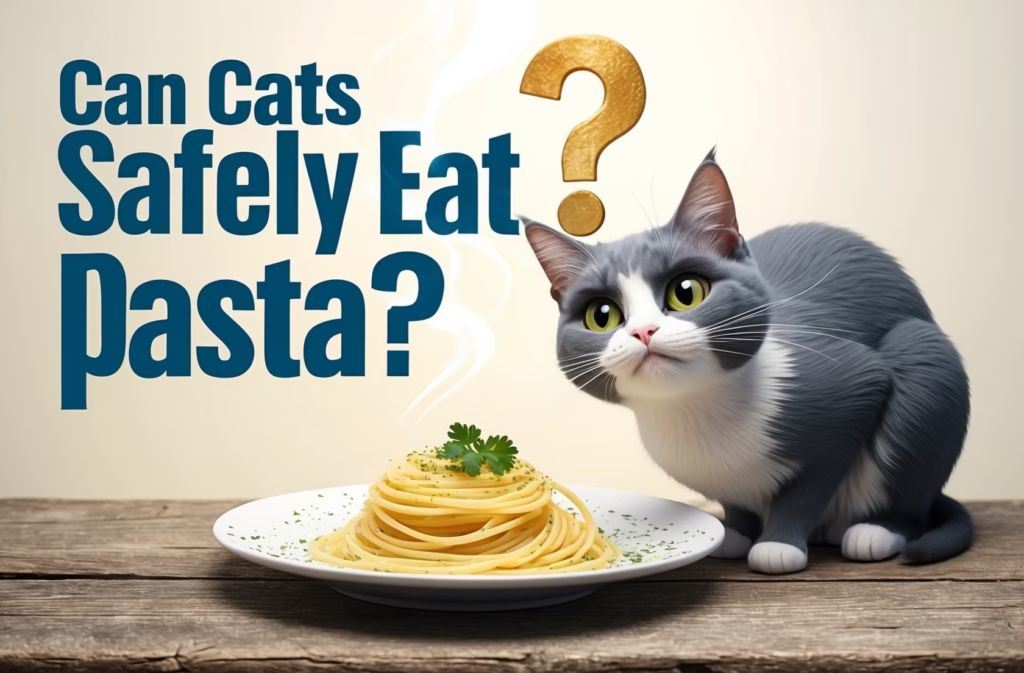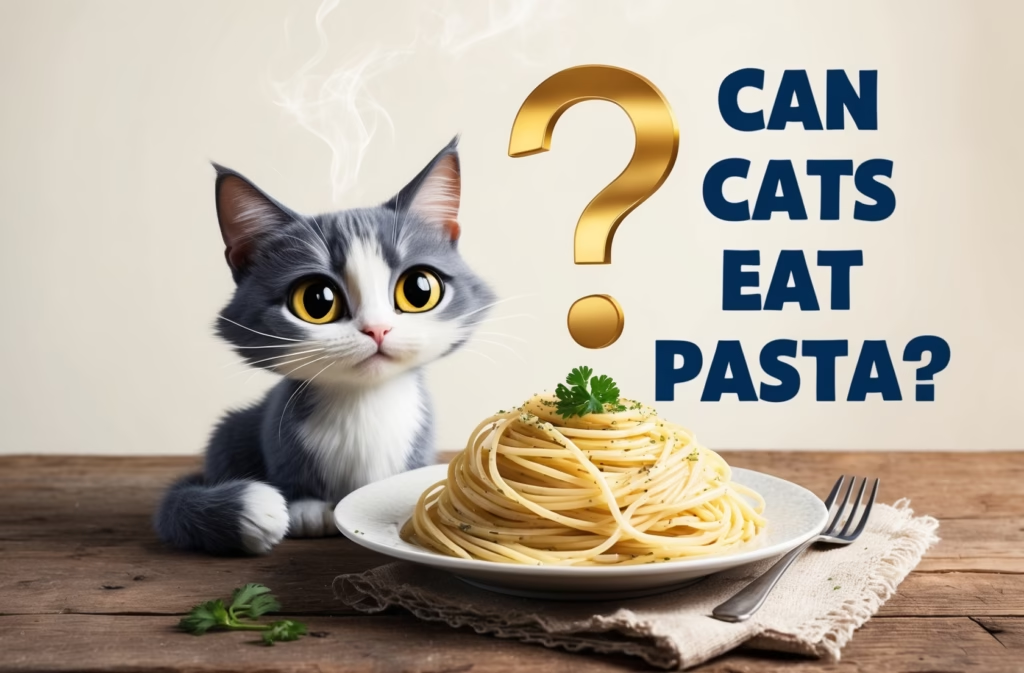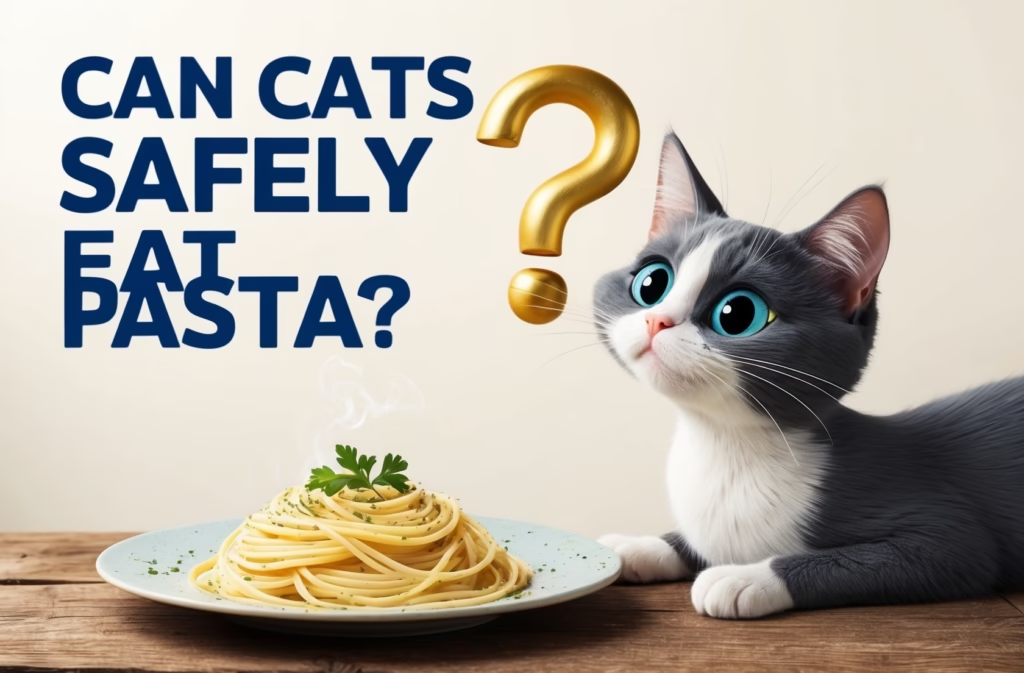Can a cat eat pasta? Is pasta bad for cats? Find out if cat eating pasta is safe & what the risks are. Learn about healthy cat food alternatives! Discover expert advice now!
Can A Cat Eat Pasta? A Comprehensive Guide
The question, Can a cat eat pasta?, is surprisingly common among cat owners. We’ve all been there, enjoying a delicious plate of pasta, and perhaps a curious feline eye is watching intently. The irresistible aroma of garlic and olive oil in a simple spaghetti aglio e olio, for example, might be too much for your furry friend to resist. But before you share that delicious bite, it’s crucial to understand the implications of cat eating pasta. This comprehensive guide will delve into the nutritional aspects, potential risks, and safe alternatives to satisfy your cat’s curiosity.
Is Pasta Bad for Cats? Understanding the Nutritional Value (and Lack Thereof)
Plain, cooked pasta, devoid of any added ingredients like garlic, onion, or seasoning, offers minimal nutritional value to cats. While it’s primarily carbohydrates, cats are obligate carnivores, meaning their bodies are designed to thrive on a diet rich in animal protein, not plants. Their digestive systems are not well-equipped to efficiently process large amounts of carbohydrates. While a tiny, infrequent amount of plain pasta might not cause immediate harm, it won’t contribute to their health and well-being. Think of it like offering your cat a tiny bit of bread; it’s not toxic, but it’s not exactly nutritious either.
Now, let’s consider the various types of pasta and how they might affect your cat. A rich and creamy Fettuccine Alfredo, for instance, (learn how to make it here), is far from ideal for a feline companion. The high fat content and the dairy in the cream sauce can cause digestive upset, leading to diarrhea or vomiting. Similarly, a hearty Spaghetti Carbonara (find the recipe here) with its rich eggs and cheese, is not a suitable meal for your cat.
The Dangers of Common Pasta Ingredients for Cats
The real danger lies not in the pasta itself, but in the common ingredients used in many pasta dishes. Garlic and onions, for example, are toxic to cats and can cause anemia if ingested. Even small amounts can lead to serious health problems. Similarly, many pasta sauces contain high levels of salt, which can be harmful to cats’ kidneys. The rich flavors of a Linguine with Lobster (try this recipe) or a vibrant Penne alla Vodka (discover this recipe) are certainly appealing to humans, but their ingredients present significant risks for cats.
Many commercial pasta sauces also contain added sugars and preservatives, neither of which is beneficial to your feline friend. These added ingredients can contribute to obesity, diabetes, and other health issues in cats. Therefore, even a seemingly harmless pasta dish can become a potential health hazard for your cat due to its ingredients. Always err on the side of caution and keep pasta out of your cat’s reach.
What Happens If My Cat Eats Pasta?
If your cat eats a small amount of plain, cooked pasta, they’ll likely experience no adverse effects. However, if they consume pasta with harmful ingredients like garlic, onions, or excessive salt, they might exhibit symptoms such as vomiting, diarrhea, lethargy, or loss of appetite. In such cases, it’s crucial to monitor your cat closely and contact your veterinarian immediately. Early intervention can often prevent serious complications.
The severity of the reaction depends on several factors, including the amount of pasta consumed, the presence of harmful ingredients, and your cat’s overall health. A healthy adult cat might tolerate a small amount of plain pasta better than a kitten or a cat with pre-existing health conditions. However, it’s always best to avoid any potential risks altogether.
Safe Alternatives to Satisfy Your Cat’s Curiosity
If your cat shows interest in your pasta, offer them a cat-friendly alternative. High-quality cat food, specifically formulated to meet their nutritional needs, is always the best option. Some cats also enjoy playing with catnip toys or engaging in interactive play sessions, which can redirect their attention and satisfy their curiosity without any health risks. Remember, offering your cat human food, even seemingly harmless foods, is not recommended. It can be tempting to offer them a small portion of your dinner, but this often leads to health issues in the long run. For more detailed information on cat nutrition, you might find the advice provided by the American Veterinary Medical Association helpful.
Addressing Common Myths About Cats and Pasta
There are many myths surrounding cats and their diets. One common misconception is that cats can eat small amounts of pasta without any repercussions. While a tiny bit of plain pasta might not cause immediate harm, it’s not a nutritional food source for cats. Regularly feeding your cat pasta can lead to health problems due to the lack of essential nutrients and the potential presence of harmful ingredients in most pasta dishes.
Another myth is that cats need carbohydrates in their diet. As obligate carnivores, cats require a diet rich in protein and fats. Carbohydrates are not essential nutrients for cats and can even lead to obesity and related health issues. The misconception often stems from the fact that some commercial cat foods include carbohydrates as fillers. However, this doesn’t mean cats should consume large quantities of carbohydrates.
The Bottom Line: Should You Let Your Cat Eat Pasta?
In short, the answer to Can a cat eat pasta? is a cautious no. While a tiny bit of plain, cooked pasta might not be immediately toxic, it’s not beneficial to your cat’s health. The potential risks associated with common pasta ingredients far outweigh any perceived benefits. It’s always best to stick to high-quality cat food formulated to meet their nutritional needs. The simple joy of a shared meal can sometimes have serious consequences for our pets. Therefore, always prioritize your cat’s health and well-being by providing a diet specifically designed for their unique needs.
If you’re looking for a simple and healthy pasta dish for yourself, a simple Spaghetti Aglio e Olio could be a great option (but keep it away from your cat!).
Remember to always consult your veterinarian if you have any concerns about your cat’s diet or health.
We hope this detailed guide has answered your questions about Can A Cat Eat Pasta and helped you understand the potential risks associated with cat eating pasta. For further information on cat nutrition, consult your veterinarian or refer to reputable online resources such as the PetMD website.
Share Your Experience!
Have you ever had an experience with your cat and pasta? Share your stories and insights in the comments below! Let’s learn from each other’s experiences with cat eating pasta. We want to hear about your experiences – good or bad – regarding your cats and pasta!

Frequently Asked Questions: Can Cats Eat Pasta?
- Can a cat eat pasta?
- Plain, cooked pasta in small amounts is generally not toxic to cats. However, it offers little nutritional value. The focus should be on a cat’s proper diet, not occasional pasta treats.
- Is pasta bad for cats?
- Pasta itself isn’t inherently bad for cats, but it’s not good for them either. It lacks essential nutrients and can lead to weight gain if fed regularly. Focusing on a balanced diet is crucial. Is pasta bad for cats? Yes, if it replaces proper cat food.
- Can cat eating pasta cause problems?
- While small amounts of plain pasta won’t likely cause immediate problems, excessive consumption can lead to obesity, digestive upset, and nutritional deficiencies. Avoid making pasta a regular part of a cat’s diet.
- What happens if my cat eats pasta?
- If your cat eats a small amount of plain, cooked pasta, they’ll likely be fine. Monitor for any digestive issues like vomiting or diarrhea. Large amounts, or pasta with added ingredients, could cause problems.
- Can a cat eat pasta with sauce?
- No, cats should not eat pasta with sauce. Many sauces contain ingredients toxic to cats, such as garlic, onions, and spices. Stick to plain, cooked pasta only (and only occasionally).
- Is it okay to give my cat a little pasta as a treat?
- While a tiny bit of plain cooked pasta won’t kill your cat, it’s not a nutritious treat. There are much better options available specifically formulated for feline nutrition. Giving your cat pasta as a treat is not recommended.
- My cat stole some pasta, should I be worried?
- If your cat ate a small amount of plain cooked pasta, you likely don’t need to worry. Monitor your cat for any unusual behavior or symptoms. If they ate a large amount or pasta with seasonings, contact your vet.
- Can kittens eat pasta?
- No, kittens should not eat pasta. Their nutritional needs are different, and pasta offers little to no benefit. Providing a complete and balanced kitten food is crucial for their growth and development.
- Can cat eating pasta lead to obesity?
- Yes, frequent consumption of pasta can contribute to obesity in cats. Pasta is high in carbohydrates and low in essential nutrients, making it an unhealthy addition to a cat’s diet. Cat eating pasta regularly can cause weight gain.
- What are better alternatives to pasta for my cat?
- Instead of pasta, focus on providing a high-quality commercial cat food that meets all their nutritional needs. Cat treats should be given sparingly and should be specifically designed for cats.

Can a Cat Eat Pasta? A Chef’s Guide to Feline-Friendly Cuisine
The question, Can a cat eat pasta? is a common one among cat owners. While the internet is awash with conflicting information, the short answer is: no, pasta should not be a regular part of your cat’s diet. However, understanding why is crucial. This blog post delves into the nutritional aspects of pasta and its potential impact on your feline friend, addressing concerns around cat eating pasta and whether pasta is bad for cats.
Is Pasta Bad for Cats? Understanding the Nutritional Landscape
Cats are obligate carnivores, meaning their bodies are designed to thrive on a diet primarily composed of meat. Their digestive systems are not well-equipped to efficiently process large quantities of carbohydrates, the primary component of pasta. While a tiny amount of pasta might not cause immediate harm, regular consumption can lead to several issues. Let’s explore this further.
The Carbohydrate Conundrum: Can Cats Digest Pasta?
Pasta, whether it’s penne alla vodka, fettuccine Alfredo, or spaghetti carbonara, is essentially refined carbohydrate. This means it lacks the essential fiber and nutrients that cats require. Excessive carbohydrate intake can contribute to weight gain, obesity, and related health problems like diabetes in cats. A balanced diet should prioritize protein and fat sources, not carbohydrates. Learn more about feline nutrition from a trusted source like the ASPCA.
The Sauce Factor: Hidden Dangers in Delicious Dishes
Many pasta dishes, like linguine with lobster or even a simple spaghetti aglio e olio, incorporate sauces that can be problematic for cats. Garlic, onions, and other common ingredients in pasta sauces are toxic to cats and can cause serious digestive upset or even anemia. Creamy sauces are high in fat, which can lead to pancreatitis in cats if consumed in large quantities. Always remember to keep your cat away from your pasta dishes, especially those with these ingredients.
Alternative Cat-Friendly Treats: Delicious and Nutritious
Instead of risking your cat’s health with pasta, focus on providing them with cat-specific treats and food that meet their nutritional needs. High-quality commercial cat food, formulated with appropriate levels of protein, fat, and essential nutrients, is the safest option. Small amounts of cooked, lean meat (chicken, turkey) can be given occasionally as a treat, but always in moderation. Consider consulting your veterinarian for personalized dietary advice for your cat.
Can a Cat Eat Pasta? A Nutritional Breakdown (Hypothetical Example)
Let’s imagine a small portion of plain pasta (1 ounce), which would be utterly inappropriate for a feline diet, purely for illustrative purposes. This example demonstrates the carbohydrate overload and lack of essential nutrients.
| Nutrient Name | Amount per Serving (1 oz Plain Pasta) | % Daily Value (2,000 calorie diet) |
|---|---|---|
| Calories | 100-110 | 5-5.5% |
| Protein | 3g | <6% |
| Fat | 1g | <2% |
| Carbohydrates | 20g | 7-8% |
| Sugar | 1g | <1% |
| Fiber | 1g | <4% |
| Calcium | Trace amounts | <1% |
| Iron | Trace amounts | <1% |
| Vitamin A | Trace amounts | <1% |
| Vitamin C | 0g | 0% |
Note: These values are approximate and can vary based on the type of pasta. This table highlights the low protein and high carbohydrate content, unsuitable for a cat’s dietary needs. For accurate nutritional information on specific cat foods, consult the product packaging.
The information provided by the FDA is an excellent resource for understanding pet food labels and nutritional content.
Summary: Cat Eating Pasta – A Recipe for Disaster?
In conclusion, while a tiny, accidental nibble of plain pasta might not cause significant harm, it’s crucial to prevent your cat from regularly consuming pasta or pasta dishes. The high carbohydrate content, lack of essential nutrients, and potential for toxic ingredients in sauces make pasta an unsuitable food for cats. Prioritize a diet rich in protein and appropriate fats, and always consult your veterinarian if you have concerns about your cat’s nutrition.
Try this Recipe, Share it, and Leave a Comment!
This blog post wasn’t about a pasta recipe for your cat, but rather a cautionary tale about what not to feed your feline friend. Instead, focus on providing nutritious and cat-friendly meals! If you have any experiences or questions about cat nutrition, share them in the comments below. And remember to share this vital information with other cat owners to help keep our furry companions healthy and happy!

Can Cats Eat Pasta? A Vet’s Guide to Feline-Friendly Noodles
The short answer is: plain, cooked pasta in small quantities is generally not toxic to cats. However, that doesn’t mean it’s a healthy or recommended part of their diet. Cats are obligate carnivores, meaning their bodies are designed to thrive on a protein-rich diet derived primarily from meat. Pasta, being primarily carbohydrates, offers little nutritional value for them.
While a tiny bit of plain pasta won’t likely harm your cat, regular consumption can lead to weight gain and nutritional deficiencies. They’re missing out on crucial nutrients found in meat, leading to an unbalanced diet. Imagine feeding your cat only pasta instead of their usual balanced meals; their health would suffer significantly.
Furthermore, certain pasta dishes are definitely off-limits. Creamy sauces like those found in Fettuccine Alfredo https://dishes-recipes.com/fettuccine-alfredo/ or Penne alla Vodka https://dishes-recipes.com/penne-alla-vodka/ are high in fat and calories, potentially causing pancreatitis or other digestive issues in cats. Garlic and onions, common ingredients in dishes like Spaghetti Aglio e Olio https://dishes-recipes.com/spaghetti-aglio-e-olio/ and many others, are toxic to cats and can cause anemia.
Even seemingly harmless additions like butter or cheese can contribute to obesity and digestive upset in cats. The richness of some sauces, such as those in Linguine with Lobster https://dishes-recipes.com/linguine-with-lobster/, can overwhelm their sensitive digestive systems. Similarly, the high fat content in Spaghetti Carbonara https://dishes-recipes.com/spaghetti-carbonara/ poses serious health risks.
In summary: Avoid feeding your cat pasta. Stick to high-quality cat food formulated to meet their specific nutritional needs. If you suspect your cat has ingested a large quantity of pasta or a pasta dish containing harmful ingredients, contact your veterinarian immediately.
Keywords: cat food, cats, pasta, can cats eat pasta, cat health, feline diet, pet food, healthy cat food, cat nutrition, pasta for cats, safe cat food.